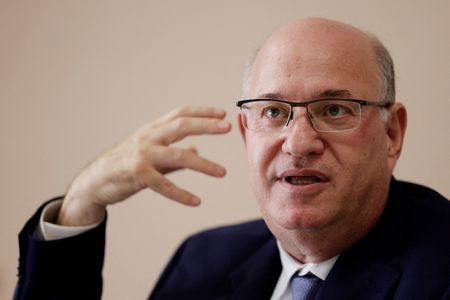By Marcela Ayres
WASHINGTON (Reuters) – The Inter-American Development Bank plans to release a statement on Saturday with joint goals of multilateral development banks that is expected to entail priority-sharing and the possibility of project co-financing, the bank’s president said on Wednesday.
In an interview with Reuters at the bank’s headquarters, IDB President Ilan Goldfajn said the effort is aimed at making multilateral banks work as a system while they explore new and innovative ways to leverage loan granting.
Officials from multilateral development banks, gathering in Washington on Saturday for a retreat promoted by the IDB, are being urged to expand the scope and relevance of their work amid growing needs of developing economies for substantial financing to address the climate transition.
According to Goldfajn, a draft of the joint note is expected to be presented at the G20 meeting on Thursday, on the sidelines of the IMF and World Bank spring meetings, after this year’s G20 leader Brazil prioritized MDB reform as the theme for the day.
“If all goes well, this exercise of ours, which is solely for the MDBs, will become a key input for the G20 and for the Brazilian presidency in their action plan for the MDBs,” he said.
One instrument the IDB is betting heavily on is the rechanneling of IMF special drawing rights (SDRs) through multilateral development banks (MDBs).
Goldfajn said he expects the IMF to approve that in a meeting scheduled for May. That could pave the way for the IDB and other multilateral banks to search for anchor investors in the near future.
He said the European Central Bank has shown a cautious stance regarding the use of SDRs with liquidity pledges, which would likely prevent bloc countries from making direct investments. Still, Goldfajn noted that they could engage in the secondary market, which would also be crucial for the project to become a reality and gain traction.
Regarding the issuance of a hybrid capital instrument, Goldfajn emphasized that depends on the IDB’s treasury, and that “pricing must be worthwhile” for the operation to proceed.
After both the IDB and the World Bank published reports on callable capital – the emergency capital pledged by governments, but not paid in, that could help MDBs expand their lending capacity – Goldfajn said the next step is to have an open and comprehensive conversation with rating agencies, which will commence this week.
Several studies indicate that MDBs could expand their lending capacity by hundreds of billions of dollars if ratings agencies modified the allowance they make for callable capital, without jeopardizing the AAA credit ratings that enable the banks to borrow at low rates and pass on the savings to developing countries.
(Reporting by Marcela Ayres in Washington; Editing by Andrea Ricci)

